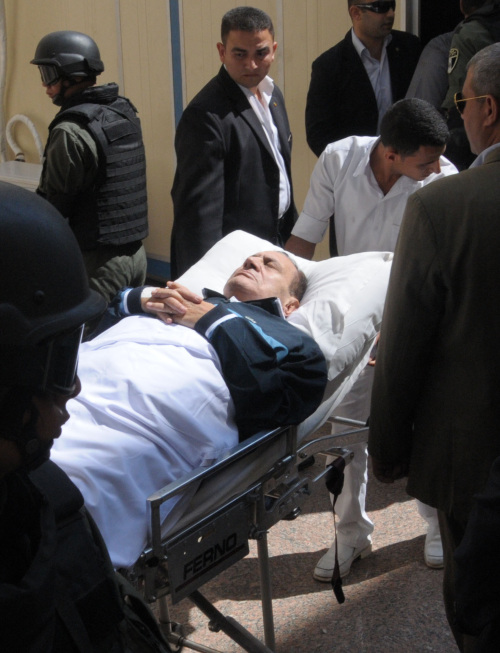CAIRO (AP) ― The judge in the trial of Hosni Mubarak on Wednesday summoned the top members of Egypt’s ruling military council to testify in closed sessions, a move Egyptians have eagerly hoped for, expecting the top generals will expose the ousted leader’s role in putting down protests against his rule.
Testifying at the landmark trial could give Field Marshal Mohammed Tantawi, who now rules Egypt, a chance to boost his image in the face of growing public criticism that the military remains too close to Mubarak’s regime. It also injects new seriousness into a trial that many saw as running aground amid confusion and allegations of perjury.
Tantawi and several other members of the country’s top leadership who were also called to testify were all members of Mubarak’s inner circle. So it is believed they can address whether Mubarak ordered police to use lethal force against protesters in the 18-day uprising that led to his downfall in February.
The 83-year-old Mubarak is on trial on charges of complicity in the deaths of protesters, a charge that could bring a death penalty.
Testifying at the landmark trial could give Field Marshal Mohammed Tantawi, who now rules Egypt, a chance to boost his image in the face of growing public criticism that the military remains too close to Mubarak’s regime. It also injects new seriousness into a trial that many saw as running aground amid confusion and allegations of perjury.
Tantawi and several other members of the country’s top leadership who were also called to testify were all members of Mubarak’s inner circle. So it is believed they can address whether Mubarak ordered police to use lethal force against protesters in the 18-day uprising that led to his downfall in February.
The 83-year-old Mubarak is on trial on charges of complicity in the deaths of protesters, a charge that could bring a death penalty.

But the sessions, due to start on Sunday, will be closed to the media and the public ― and the judge banned Egyptian media even from reporting on information leaked from the testimony. Announcing the decision at the trial’s latest session Wednesday, judge Ahmed Rifaat said the order was for the “protection of national security and higher national interests.”
That will thwart public hopes for the full airing of how the leadership dealt with the uprising at an important juncture in Egypt’s history. It could also prevent the emergence of any new details about to what extent the military ― which depicts itself as a “full partner in the revolution” ― challenged Mubarak during the uprising.
“We are talking about a regime that has fallen, and lost its legitimacy. Revealing the truth is an essential part of the process,” said Abdullah al-Sinawi, a prominent columnist, questioning the necessity of keeping the sessions closed.
Among the others summoned by the court were chief of staff Sami Anan ― the second highest-ranking figure on the military council ― and Omar Suleiman, who was appointed vice president by Mubarak during the uprising and was his powerful intelligence chief and a close aide for nearly two decades. He is seen as a figure holding many of the regime’s secrets.
It is unprecedented for a court in Egypt to summon such high level figures, normally seen as above question ― particularly ones from the highly secretive military.
Ramadan Ahmed, the father of a 16-year-old protester killed in Alexandria, said that alone made the decision a “positive development” despite the secrecy of the session.
“This is basically a head of state testifying in court. It has never happened before in the Middle East,” Ahmed said.
El-Sinawi said the summoning “gives the trial a more serious tone that it started to miss, and to signal that no one is above the law,” said el-Sinawi.
“It also gives the marshal the chance to improve his image,” he added.
Many saw the ruling military as reluctant to put one of their own on trial ― Mubarak was previously commander of the air force and a pilot ― and it only succumbed after repeated public protests. Protesters have grown increasingly critical of the Armed Forces Supreme Council’s management of the post-Mubarak transition and accuse Tantawi and other top brass of failing to cut ties with remnants of Mubarak’s regime.
Protesters have called for a large-scale rally ― their first in over a month ― for this Friday, dubbing it “Correcting the Course,” to call for an end to military rule, among other demands.
The question is whether Tantawi ― a longtime Mubarak associate ― will pin blame for the protester deaths on the former president and how directly. Tantawi has said in earlier public comments that the military refused to fire on protesters ― a sign many read as meaning he refused orders to do so from his commander-in-chief. But Tantawi has also appealed for the public to “leave the past aside,” seen as a sign he wants lenience for Mubarak.





![[K-pop’s dilemma] Can K-pop break free from ‘fandom’ model?](http://res.heraldm.com/phpwas/restmb_idxmake.php?idx=644&simg=/content/image/2024/05/09/20240509050541_0.jpg&u=20240509173751)




![[News Analysis] Yoon's first 2 years marked by intense confrontations, lack of leadership](http://res.heraldm.com/phpwas/restmb_idxmake.php?idx=644&simg=/content/image/2024/05/09/20240509050612_0.jpg&u=20240509233252)







![[Today’s K-pop] NCT’s Mark to drop 1st solo album in February 2025](http://res.heraldm.com/phpwas/restmb_idxmake.php?idx=642&simg=/content/image/2024/05/10/20240510050597_0.jpg&u=)